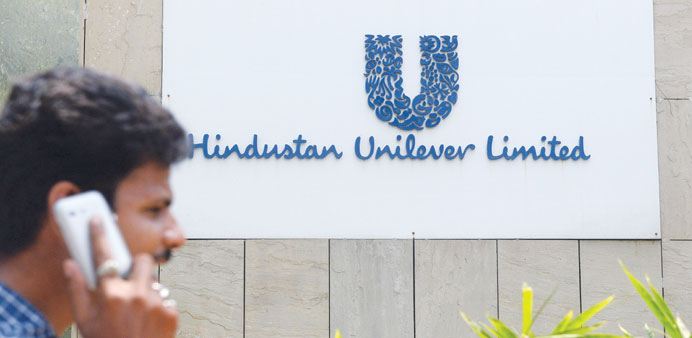A pedestrian talks on his mobile phone as he walks past the logo of Hindustan Unilever Limited outside its office in Mumbai yesterday. Unilever yesterday announced a $5.4bn offer to raise its stake in its Indian subsidiary, eyeing explosive sales of branded consumer items to the Asian country’s growing middle class.
AFP/Mumbai
|
|
Food giant Unilever yesterday announced a $5.4bn offer to raise its stake in its Indian subsidiary, eyeing explosive sales of branded consumer items to the Asian country’s growing middle class.
The Anglo-Dutch firm made an offer to buy another 22.5% of already majority-owned Hindustan Unilever (HUL) in a proposed deal that would increase its control to 75%.
The offer, which saw HUL shares surge, is part of Unilever’s plan to increase its presence in emerging markets such as India, where HUL’s products such as skin fairness cream “Fair and Lovely” and Lux soaps are best-sellers.
“This represents a further step in Unilever’s strategy to invest in emerging markets,” said Paul Polman, Unilever’s chief executive, in a statement.
Polman said the “long heritage” and the “significant” growth potential of India’s economy make it a long-term priority for the group.
Unilever has proposed buying 487mn shares at Rs600 per share, a premium of 20.6% on the closing price yesterday, with purchases to begin in June.
Analysts welcomed the move, which comes at a time when the consumer goods sector remains bright despite an overall slowdown in the Indian economy, which grew at an estimated 5% in last fiscal year.
“India is one of the largest consumption stories going around in the world, which cannot be ignored,” said Anil Talreja, partner at consultancy Deloitte India.
He said consumption demand from the vast and growing middle-class was strong.
“India is a consumption-led story and Unilever wants to consolidate its position and get a fair share of this consumption,” added Ankur Bisen, vice-president in retail and consumer goods at consultancy Technopak.
India’s retail sector is estimated to be worth $490bn, of which consumer goods constitute about 70% or $350bn, according to Bisen.
Last year, India’s Congress-led government relaxed legislation to allow foreign retailers such as US supermarket giant WalMart to set up shop in India and sell directly to Indian consumers to boost investment from abroad.
On Monday, HUL reported a surprise 14.7% rise in net profit for the January-March quarter to Rs7.87bn ($145mn) in the three months to March, from Rs6.86bn a year earlier.
Expectations had been for a profit of Rs7.5bn.
As well as making top brands for the consumer products market, HUL has a huge distribution network stretching across thousands of supermarkets and small retailers in India.
Shares in HUL, whose sales are watched by analysts as a barometer of consumer demand, were trading at Rs578.55 later in morning trade, up 16.27%.
Other consumer stocks also rose, with Colgate Palmolive up 4.76% to Rs1,470.0 and Nestle India up 5.69% to a high of Rs4,988.5.

